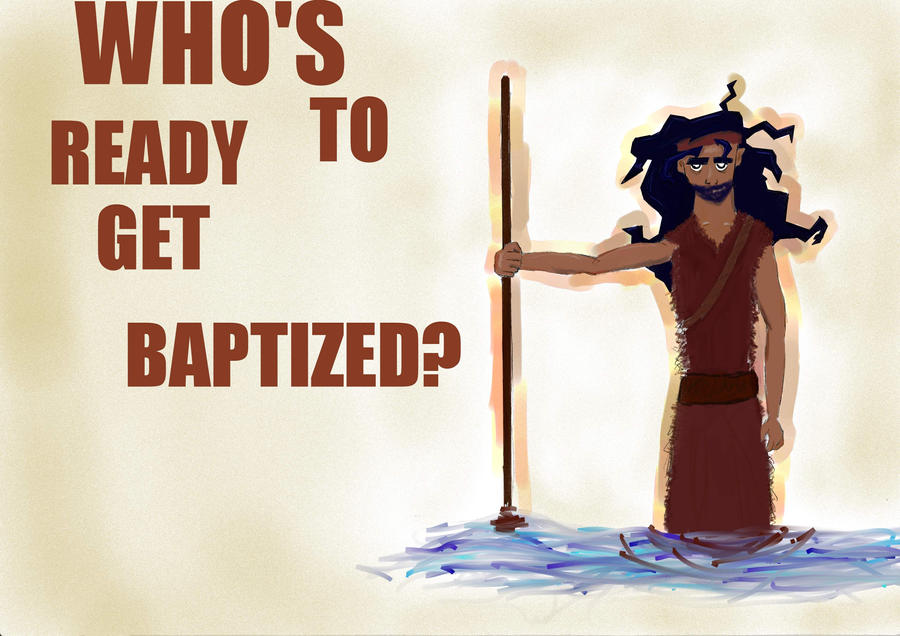
What is it about Jesus that makes Him so hard to be seen as the One? John the Baptist says that he wouldn't have known Jesus was the Messiah if God hadn't told him ahead of time to watch for a sign. He was supposed to watch for the Spirit to settle on someone. Again, we have that imagery from Genesis. God the Creator, speaking words about the Spirit. When John saw the dove settle on Jesus, he knew.
What about Jesus makes it so hard to take Him seriously? I still struggle with it. Just today I blew Him off completely and did things my way, making a total mess of it. (And it's only 10 am!) What would help was if He showed up with a sword, swinging, demanding, telling everyone to drop and give Him twenty! He will do this one day, but not yet. He comes as the "Lamb of God", John the Baptist says. (This is, by the way, the only place in the whole Bible that phrase is used.)
But then, when I do screw up, His love and willingness to carry my mess drops me to my knees. I am so completely messed up and unworthy of His forgiveness, yet He drops it, heavier than any sword. He forgives, loves, and reaches out to me, over and over and over.
This Lamb of God is unlike anything I've ever known.
Tuesday, December 9, 2008
Doves, Lambs, and Swords
Monday, December 8, 2008
Who Knew?! John 1:19 - 28

Reading through John 1:19-28 today. Wow, I learned a lot!
For example, in this passage, John begins telling us about the first week of Jesus' ministry. I never noticed the "the next day" verses in 29, 35, 43, etc. John continues his parallel to Genesis 1 that he began in the very beginning of the book. I love that kind of detail that God puts in. Here the creator is creating again, a new ministry, a new era, a new history. All in seven days, ending with a miraculous marriage and party. And what about this idea of ending with a marriage? The whole Bible begins with a marriage (Adam and Eve), and ends with a marriage (Christ and the church). So, here in Jesus' first week is a microcosm of history. Too cool!
Secondly, I want to be like John the Baptist (JtB). I've read this passage a couple of dozen times, and never really stopped and looked at what John is doing here. JtB gets this delegation out to see him, to legitimize his ministry. It's his chance to step onto a national stage and establish himself. What an opportunity! But he blows it. As these big leaders question him, each answer speaks less and less about him and more and more about Jesus. His first answer is "I am not the Christ". Then "I am not". Then down to "No". He simply doesn't want to talk about himself. That is ALL I want to do most of the time. But JtB wants to talk about Jesus. I love that, and am going to consciously work towards that.
Also, the bit about him being unworthy to strap Jesus' sandal is something I never got before, at least not totally. I just discovered that in their culture, a disciple would do many things to help out their rabbi. The rabbi wouldn't get paid for teaching the scriptures, it was an honor. (I don't get paid for teaching either. I love that part of my job. I get paid for doing paperwork! Ugh!) So the disciples would offer service to help out their rabbi. But there were limits to what they would do. There is an ancient rabbinic saying that goes "Every service which a slave performs for his master shall a disciple do for his teacher except the losing of his sandal-thong." It was beneath the disciple to do this. But here, JtB picks that very thing to say he is unworthy of doing. I often think Jesus owes me, and JtB says he isn't even worth touching Jesus shoes. I have much, much work to do in this area.
Just some thoughts as I was reading today. I love the fact that this book never gets old!
Wednesday, December 3, 2008
Deep Justice in a Broken World

Recently, I've read Deep Justice in a Broken World. I've had my Taylor students working though it. Of course, I'm learning more from teaching it than they are. They are brilliant, I'm not. So, I have more to learn.
The core idea of this beast is that there are three levels of service. The first is physical, and it like giving food out at a food pantry. Excellent ministry, and one of my favorite service opportunities at our church! The second level is relational. This is more of befriending the folks who are hungry, and helping them learn to grow their own garden. You hang with them in the training time, and then stay with them afterwards. I am not nearly as good at this level. The third level is systemic, and this is the farthest from my current lifestyle. This is asking why the people are hungry to begin with, and then doing the long term work to fix the systems around them. Political, social, anthropological, etc. It's working to find what are the reasons working men and women still can't feed their kids? What is taking their money, and how do we help rectify that situation?
The book challenges that all three are the realm of a solid, Biblical youth ministry. Man, that hurts. We are barely scraping 1/3 of that calling. So, I'm looking at it and praying about it. I want to dismiss the whole thing as socialism run amok, and unrealistic for kids. But, I know better. We are called to defend the poor, the widow, and the oppressed. You can only help the oppressed by resolving the oppression. So it is with this that I am wrestling.
What does this look like in Shelbyville? What do we need to meet physically, then emotionally, and then systematically? We have a growing homeless population. I know we must do something. So we are. We will start with what we know, and trust that as we seek, ask, study, and look, God will show us the next piece.
What about you? Your ministry? What will you do?
Tuesday, December 2, 2008
Youth Ministry 3.0

When I was in Nashville for the NYWC, I picked up Marko's Youth Ministry 3.0. I've been reading a lot of the reviews on it, which you can find on his blog. They are pretty accurate with what I found. I was really surprised at how short it was. Don't know why that surprised me. I guess I thought "manifesto" and assumed a few hundred pages. Instead, it was 108 pages, mid sized print, with 27 pages of footnotes (that part I appreciated). I read it on three levels: first, as a lifer in youth min (17 years and counting), what is God showing me here? second, as a leader of a mid sized team of leaders, is this helpful for them? third, as a youth ministry prof, will this work for my college students?
In short order, it helped me personally to ask questions. It isn't a resource that I will put in my volunteers hands. They don't go this philosophical in their thinking of ministry. I'm not sure about my students. I'll re-read it for them again. It might hit, I'll have to see.
Overall, Marko has done a great job of asking questions. His retelling of how we got where we are is succinct, but helpful. For more of that thought, look to Revisiting Relational Youth Ministry by Andrew Root. (Deep, but excellent!) I think Marko's tone is one of the healthiest I have heard in an author wanting to question the church; he's honest it seems, owns his own contributions to how we got here, isn't advocating an "abandon ship" attitude, and wades in with ideas and theories, knowing they are not a "one size fits all" solution. I'm really impressed. Marko, keep writing in this vein, you're only going to get better at it. I need it, and we need it.
But, as a youth pastor at a large church in a small Midwest town, does it help? Yes. And no. I feel like Marko is pointing to the same questions I'm asking. He is giving permission to continue the ongoing conversation about "why is this not working?" He provides a model for humble AND honest dialogue. He reminds me that I am not alone. But I don't feel any farther down the road than before I read the book. I just feel like I have more companions on this journey to "who knows where?"
Don't misunderstand. I'm not discouraged. I know God is well aware of where we are going. He just hasn't shown me the greater picture. I'm not sure He will. I'm not sure He will give it to anyone to write a book about. That's the challenge of the 3.0 idea. Organic. Different. Marko makes this clear. It won't be another program we all adapt. It is simply a journey. The Way. Jesus.
I'm just glad Marko is on it with me.

